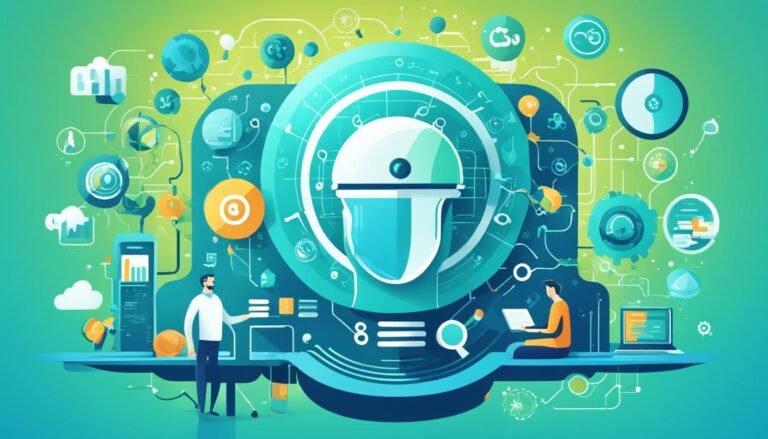Using AI to Increase Conversion Rates in Your Online Business
In the fast-changing world of digital marketing, one key metric is key to success: conversion rate. What if we told you that the secret to better conversion rates is artificial intelligence (AI)? This technology can change your online business and bring amazing results.
Are you ready to make your e-commerce platform better and beat your competitors? Let’s explore how AI is changing conversion rate optimization (CRO). We’ll show you strategies to take your online business to new success levels.
Key Takeaways
- Leveraging AI can significantly boost conversion rates in your online business.
- AI-powered personalized product recommendations can generate over 31% of an e-commerce store’s revenue.
- Efficient AI chatbots can enhance the customer experience and increase sales by up to 67%.
- AI-driven predictive analytics and dynamic pricing strategies can optimize operations and improve conversion rates.
- Integrating AI into your marketing and optimization efforts can lead to substantial increases in conversion rates.
Understanding Conversion Rates in E-commerce
Conversion rate is key to measuring an e-commerce business’s success. It shows the percentage of visitors who make a purchase. The average rate is between 2.5% to 3%, aiming for a 3% goal for online stores.
Defining Conversion Rate
Conversion rate is found by dividing the number of conversions by the total visitors. This shows how well a website turns visitors into customers.
Factors Affecting Conversion Rates
Many things can change a website’s conversion rate, including:
- User Interface (UI) and User Experience (UX) design – A good design makes the customer journey better, helping to increase conversion rates.
- Value proposition – Clearly sharing the unique value of your products or services can make visitors more likely to buy.
- Call-to-action (CTA) – A strong CTA in the right place encourages visitors to act.
- Website performance – Quick loading and a design that works on all devices keeps visitors interested.
- Copy and content – Good content guides visitors through the buying process.
- Trust and credibility – Trust is built with customer reviews and security seals, leading to more conversions.
- Customer service – Great customer support improves the user experience and can lead to more sales.
- Targeted traffic – Bringing in the right audience with targeted marketing can make visitors more likely to buy.
Understanding and improving these factors helps e-commerce businesses increase their conversion rates and grow.
| Metric | Average Value |
|---|---|
| Conversion Rate | 2.5% – 3% |
| Bounce Rate | Minimize to retain visitors |
| Exit Rate | Monitor for potential issues |
| Click-Through Rate (CTR) | Crucial for ad and email marketing |
| Average Session Duration | Impacts conversion rate |
| Average Page Depth | Indicates user engagement |
Using these insights and analytics tools, e-commerce businesses can create strategies to improve their conversion rates and grow sustainably.
The Role of AI in Boosting Conversion Rates
In the world of e-commerce, making more sales is key for businesses. AI-powered conversion rate optimization (CRO) has changed how companies tackle this goal. It uses machine learning and predictive modeling for smarter decisions, making the process faster and more effective.
AI-powered CRO looks at lots of customer data, like what they browse and buy. This helps AI predict what customers want and make their shopping better. It offers personalized product tips and changes prices to match what customers like, making more people buy.
AI is also changing how people shop online. It uses natural language processing (NLP) and image recognition. NLP makes search results better by understanding what customers are looking for. Image recognition helps find products by looking at pictures, giving customers more relevant suggestions.
| AI-Powered E-commerce Enhancements | Impact on Conversion Rates |
|---|---|
| Personalized product recommendations | Increased customer engagement and higher average order value |
| Intelligent site search and product discovery | Improved product findability and reduced search abandonment |
| AI-driven chatbots for customer support | Faster response times and higher customer satisfaction, leading to reduced cart abandonment |
| Dynamic pricing strategies | Optimized pricing that meets customer demand and maximizes sales |
As AI gets better, it will open up more ways for businesses to increase sales. By using AI, e-commerce companies can offer more personal service, work more efficiently, and engage with customers better. These are key for growing and succeeding online.
Personalized Product Recommendations with AI
In today’s online shopping world, businesses need to stand out to keep customers coming back. Using AI-driven personalized product recommendations is a key strategy. AI helps by looking at what customers like and suggest products just for them.
Studies show that 76% of customers want their online experiences tailored to their needs. Also, 56% of shoppers are more likely to visit a site again if it suggests products they might like. AI-powered tools meet this need, making customers more loyal and increasing sales.
These AI systems get smarter over time by learning from how people interact with them. They look at what customers click on, what they buy, and how long they stay on the site. Then, they use this info to make sure the customized product recommendations fit what each person likes.
“Well-targeted recommendations enhance the shopping experience, potentially boosting conversion rates and average order value.”
Things like the time of day, the season, and what device someone is using also play a part in making recommendations more personal. This makes shopping more fun and engaging for everyone. By using AI, businesses can give personalized product recommendations to lots of people, making them feel special.
The effects of this tech are huge. Experts think Generative AI could bring in up to $275 billion more profits to the fashion industry by 2030. This shows how big a deal AI-powered personalization is. As what customers want changes, using AI for customer profiles and customized product recommendations will be key for online stores to succeed.
AI-Powered Site Search for Better User Experience
In today’s e-commerce world, shoppers want a smooth and quick shopping experience. Finding products fast is key to boosting sales. AI-powered site search changes how customers look for and find products in your store.
Improving Product Discoverability
AI search engines show the best results fast, thanks to their smart language skills. They understand what customers are searching for, even if they don’t use the right words. This makes it easier for shoppers to find what they want, leading to more sales.
Enhancing Site Navigation
AI search also makes navigating your site better. It learns what users like and suggests products they might be interested in. This helps customers make decisions faster and builds trust, leading to more sales.
Using AI, businesses can give shoppers a personalized and easy experience. This makes finding products simple and boosts sales. As online shopping grows, AI search will be key for retailers.
Using AI to Increase Conversion Rates in Your Online Business
In the fast-paced world of e-commerce, finding new ways to boost sales is key. Using Artificial Intelligence (AI) in marketing can be a game-changer. AI helps online businesses improve customer experiences and increase sales.
According to the Boston Consulting Group, 14% of companies saw their sales and profits go up during the pandemic. They used digital tools like automation and data analytics. Companies that used big data to make personalized experiences saw up to 10% more revenue. Starbucks saw a 300% jump in spending with their AI-powered system, and 80% of customers like brands that know them personally.
AI can greatly improve conversion rates with personalized product recommendations. It looks at what customers like and suggests products they might enjoy. This makes customers more likely to buy. AI-powered site search also helps customers find products faster, making them more likely to buy.
AI chatbots are another way AI helps in e-commerce. These chatbots answer customer questions quickly and give personalized advice. Last year, the demand for live chat went up by 8.5%. Amtrak saw fewer calls and emails after using an AI chatbot.
AI is also great for A/B testing and website optimization. It helps businesses find the best strategies online. Cosabella boosted its sales by 38% and got 1,000% more newsletter sign-ups with AI-driven testing.
Using AI in marketing can also help with predictive analytics and forecasting. It helps businesses manage their supply chain and set the right prices. Most e-commerce sites use tools like Conversion Rate Optimization (CRO) to turn visitors into buyers.
In summary, AI is a powerful tool for online businesses. It helps with personalized recommendations, customer support, and optimizing websites. AI is changing the game in e-commerce, giving businesses a competitive edge.
| AI-Powered Strategies | Impact on Conversion Rates |
|---|---|
| Personalized Product Recommendations | Up to 10% higher revenues |
| AI-Powered Site Search | Improved product discoverability and streamlined customer journey |
| AI Chatbots for Customer Support | 8.5% growth in demand for live chat |
| A/B Testing and Website Optimization | 38% increase in conversions and 1,000% lift in newsletter signups |
| Predictive Analytics and Dynamic Pricing | Optimized supply chain and competitive pricing strategies |
Leveraging AI Chatbots for Efficient Customer Support
Online businesses need efficient and quick customer support to boost conversions. AI chatbots are a great solution. They use natural language processing (NLP) to understand what customers are saying. This lets them give answers that feel human.
Natural Language Processing in Chatbots
Thanks to NLP, chatbots can talk to customers in a way that feels real. They get what customers need and respond with care. This makes customers happier and more likely to buy.
Chatbot Integration with FAQs
Chatbots work even better when they’re linked to FAQs. They can quickly find answers to common questions. This saves time for both customers and support teams, making everyone happier.
Studies show AI chatbots can increase conversions by up to 100%. They also help generate more leads and make customers happier. As businesses see the benefits, more are using chatbots for better customer support.
A/B Testing and Website Optimization with AI
Using artificial intelligence (AI) can change the game for businesses wanting to increase their sales. AI helps with A/B testing and making websites better. This leads to a more personal and engaging experience for users, which means more sales and profits.
A study by Boston Consulting Group found that companies using AI in marketing see a 20% boost in conversion rates. AI looks at lots of data, finds patterns, and tests website parts to see what works best for getting more sales.
Amazon uses AI and A/B testing to make shopping personal. They test different ways to suggest products to customers. This makes shopping more effective and increases sales. HubSpot uses AI to test email marketing, finding the best subject lines and buttons to get more people to open and click.
AI helps businesses online make more money, improve the user experience, and boost their return on investment. It automates tasks like testing and analyzing data. This leads to better conversion rates and website performance.
“AI has revolutionized CRO, allowing for data analysis, user behavior anticipation, and website element optimization to enhance conversion rates.”
AI in A/B testing and making websites better has many benefits. It can look at lots of variables fast, cutting down on mistakes and biases. This means more reliable results. AI also predicts future trends and user reactions, helping businesses make smart decisions for higher sales.
But, using AI in A/B testing and making websites better comes with challenges. There are privacy and safety issues, and we need to think about how to use the results right. Still, AI can change how businesses work on website optimization and data-driven decisions. This could lead to new growth and success.
Predictive Analytics and Forecasting for Supply Chain Optimization
As e-commerce grows, businesses use predictive analytics and forecasting to improve. These tools help companies make better decisions in supply chain, inventory, and lead generation.
Predictive analytics helps e-commerce businesses look at their data to guess what will happen next. This way, they can make smarter choices in areas like marketing, finance, and logistics.
- AI-powered forecasting cuts down on stockouts by accurately guessing demand, making inventory management better.
- Predictive analytics also helps in making delivery times faster, improving loyalty programs, and increasing customer engagement.
- Data shows that personalized product suggestions can really help increase customer conversion rates.
Using predictive analytics and forecasting in supply chain has big benefits. Companies can cut warehousing costs by 5-10%, reduce admin costs by 25-40%, and lower the chance of not having products by up to 65%. AI-based forecasting can also automate up to 50% of tasks, making things run smoother and more efficiently.
“AI empowers businesses to make data-driven decisions for strategic planning, transforming how they operate and making them more resilient and efficient.”
The use of predictive analytics and forecasting will be key for e-commerce as it grows. These technologies help businesses optimize their supply chains, manage inventory better, and generate more leads.
Dynamic Pricing Strategies with AI
In today’s fast-paced e-commerce world, staying ahead means always adjusting your prices. Using AI algorithms and real-time data helps online stores tweak their dynamic pricing. This way, they can keep up with market conditions and competitive pricing.
Adapting to Market Conditions
AI helps set prices based on demand, which can lead to more sales. It looks at past sales, how customers act, and outside factors. This way, it suggests the best prices to charge when demand is high or low.
Competitive Pricing with AI
Adding AI to pricing lets businesses watch competitor prices closely. They can quickly change their own prices to stay ahead. This quick response can make profits go up by 22% and reduce extra stock by 30%.
AI also lets businesses set different prices for different customers. This makes customers happier and more loyal. By using AI, companies can make smart pricing choices to increase sales.
“Implementing AI dynamic pricing strategies in eCommerce can automate the process of setting and changing prices based on real-time data analysis, providing businesses with agility and responsiveness, particularly beneficial for retailers with large product inventories.”
Big names like Amazon, Uber, Walmart, and Starbucks are using AI for dynamic pricing. This helps them stay competitive, increase sales, and make more money in the fast-changing online market.
Conclusion
In today’s online world, businesses need every edge to boost conversions and increase revenue. Using AI in marketing has changed how companies work on making more sales. AI helps by using machine learning, predictive analytics, and making marketing more personal.
AI has brought new ways to market products, like personalized recommendations and AI chatbots. These tools help businesses use AI to boost their sales efforts. By using AI to increase conversion rates, machine learning, predictive analytics, and personalized marketing, companies can make their campaigns hit the mark with their audience.
As more businesses use AI in marketing, those that use data-driven strategies and conversion rate optimization will lead the pack. They’ll be ahead in the fast-changing digital world.
Source Links
- 7 ways AI recommendations can improve e-commerce conversion rates
- The AI guide to conversion rate optimization (CRO)
- Ecommerce CRO: Conversion Rate Optimization Tips + Tricks
- Ecommerce CRO: 15+ Proven Conversion Rate Optimization Tips
- 7 Strategies To Optimize Ecommerce Conversion Rate With AI
- How AI Can Improve Conversion Rates in Ecommerce
- The Impact of AI on E-commerce Conversion Rates: Enhancing Online Sales Efficacy | ProfileTree
- How AI-powered product recommendations increase conversion – Algolia Blog
- AI Product Recommendations to Boost Conversions on Shopify
- Top AI Tools to Boost Your Business’s Online Presence | RankWorks
- What is AI-powered site search? | AI Search
- What Is AI-Powered Site Search?: How It Works and the Benefits
- How AI Can Impact Your Conversion Rates | Tips to Boost CRO
- 9 Best Conversion Rate Optimization Tools For E-commerce
- Top 20 Conversion Rate Optimization Tips | VWO
- A Chatbot for Sales: 6 Ways AI Assistants Boost Conversion
- How AI is Transforming Customer Experience for Businesses
- Leveraging the Power of AI Chatbots for Your Business Website
- Conversion Rate Optimization with AI in 2023 (+6 Examples)
- 7 Ways to Use AI for A/B Testing: An In-Depth Guide [+ Expert Tips]
- A/B Testing vs. AI: The Dynamic Duo of Conversion Optimization
- How Does AI Predictive Analytics Drive Higher eCommerce Profits?
- AI-Based Demand Forecasting: Optimizing Supply Chains
- AI for Demand Forecasting: B2B Supply Chains
- AI-Powered Dynamic Pricing Strategies for eCommerce
- AI-Powered Dynamic Pricing: Illuminating Success Stories Across Diverse Industries
- AI-Driven Dynamic Pricing in E-Commerce Business
- How To Use AI to Optimize Your Marketing Conversion Rates.
- The impact of artificial intelligence on conversion rates
- Using AI to Improve Conversion Rates: Best Practices







